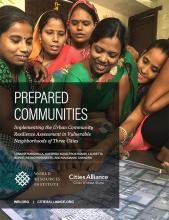/ library resources
Showing items 1 through 9 of 79.Climate change affects poor and marginalized communities first and hardest.
In a world grappling with the challenges of food insecurity, climate change, landscape degradation, and rural poverty, regreening offers a path forward, especially in dryland areas.
Almost one-quarter of the world’s land area has been degraded over the past 50 years because of soil erosion, salinization, peatland and wetland drainage, and forest degradation.
Restoration is more complex than just planting trees. It requires that farmers, rural communities, businesses, and government agencies—all with different interests—unite behind a shared vision.
A large number of countries recognize the role of forests in carbon sequestration and committed in their NDCs to protect forests, reduce deforestation rates, and restore forestlands.
Indigenous and community lands, crucial for rural livelihoods, are typically held under informal customary arrangements.
This playbook details 23 behavior change strategies to help food service companies support diners in choosing more sustainable, plant-rich dishes when shopping or dining out – action that’s important for meeting global emissions goals and achieving the Paris Agreement on climate change.
Sustainable land governance requires that all members of a community, both women and men, have equal rights and say in decisions that affect their collectively-held lands.
La gobernanza sostenible de la tierra requiere que todos los miembros de una comunidad, tanto mujeres como hombres, tengan los mismos derechos y voz en las decisiones que afectan a sus tierras de propiedad colectiva.
Paginering
Land Library Search
Through our robust search engine, you can search for any item of the over 73,000 highly curated resources in the Land Library.
If you would like to find an overview of what is possible, feel free to peruse the Search Guide.



